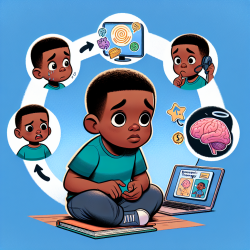Here are the key findings and practical applications:
Key Findings
- Children with DLD scored significantly lower than their typically developing (TD) peers on non-verbal intelligence tests.
- Children with DLD exhibited lower performance in working memory (WM) capacity and executive functions (EFs), specifically in updating and task-switching.
- Verbal fluency, both phonological and semantic, was notably lower in children with DLD compared to TD peers.
- Interestingly, there were no significant differences between the groups in inhibition measures, suggesting that WM deficits in DLD may not be directly related to inhibition inefficiencies.
Practical Applications
1. Emphasize Working Memory Interventions
Given the pronounced WM deficits in children with DLD, incorporating targeted WM exercises into therapy sessions can be beneficial. Techniques such as chunking information, using visual aids, and repetitive practice can help enhance WM capacity.
2. Focus on Executive Function Training
Practitioners should integrate activities that challenge and improve executive functions. Tasks that involve updating information and switching between tasks can be particularly effective. For example, using n-back tasks or engaging children in activities that require frequent rule changes can stimulate these cognitive areas.
3. Enhance Verbal Fluency
Verbal fluency exercises should be a staple in therapy. Activities that encourage children to generate words based on phonological or semantic criteria can improve both phonological and semantic fluency. Examples include word association games, category naming, and rapid naming tasks.
4. Tailor Interventions to Individual Needs
The study underscores the importance of personalized interventions. Assess each child's strengths and weaknesses in WM, EFs, and verbal fluency to tailor your approach. This individualized strategy can lead to more effective outcomes.
5. Encourage Further Research
Practitioners should stay informed about the latest research and consider participating in studies that explore cognitive functions in children with DLD. This involvement can provide deeper insights and contribute to the development of more effective intervention strategies.
To read the original research paper, please follow this link: Executive Function, Working Memory, and Verbal Fluency in Relation to Non-Verbal Intelligence in Greek-Speaking School-Age Children with Developmental Language Disorder.










